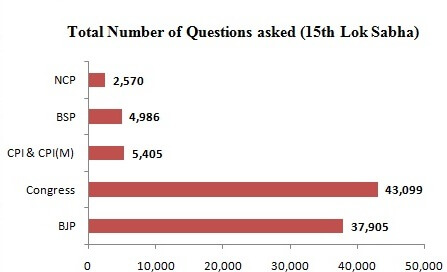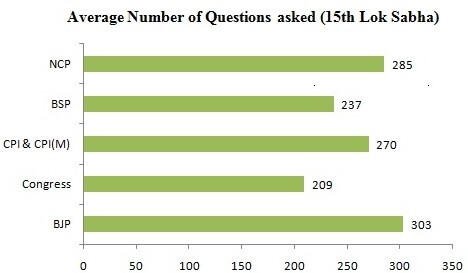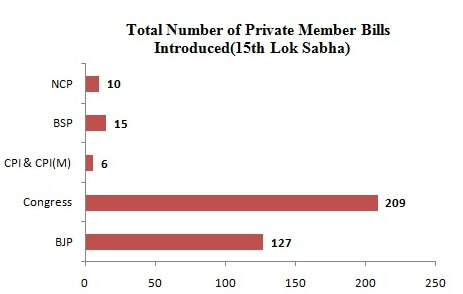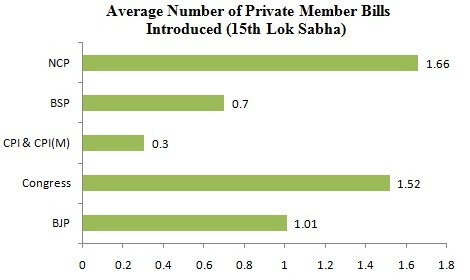Parliament is the house of our elected representatives and thus is the seat of Democracy of our nation. Parliament has been entrusted mainly with three responsibilities which can briefly be outlined as follows:
- Making laws in its capacity of being the highest law making body in the country
- Act as a guardian of democracy by keeping a check on the functioning of the government
- As a representative institution , to highlight the important issues faced by the people
Active participation of Members of Parliament (MPs) in the proceedings of house is therefore crucial in the fulfilment of Parliament’s responsibilities. For enabling this active participation, few parliamentary procedures are in place. Three of the important parliamentary procedures where MPs can actively participate are;
- Asking Questions: MPs ask questions in the parliament to raise issues of concern, to hold the government accountable to its actions and so on. Questions are admitted in the house by giving prior notice to the house’s secretariat. But at times questions without notice can also be taken up in the house subject to the Speaker’s discretion. Answers to the questions can be requested orally or in writing.
- Being part of or initiating debates: The image that comes to our mind when we think of Lok Sabha is that of MPs fiercely arguing with each other. This image exists for a reason. The questions asked, grow into discussions and eventually lead to debates. There are allocated time slots in the Parliament’s schedule for having discussions and debates.
- Introducing Bills: Bills are proposed laws or proposed amendments to existing laws. They are the main instrument in accomplishing Parliament’s law making responsibility. When ministers introduce bills they are known as ‘Government Bills’ and when MPs who are not ministers introduce bills they are known as ‘Private Member Bills’. Government Bills are the government’s duty, but a private member bill is an attempt by an MP to play a proactive role in policy making.
The analysis presented here gauges the performance of MPs floor of the house. This is done on the basis of their use of these three parliamentary procedures i.e. asking questions, taking part in debates and introduction of private member bills.
These procedures have been specifically chosen as the parameters to determine MPs performance as they give a fair indication of their inclination towards participation in parliamentary functioning & decision making. Also the ‘introduction of private member bills’ category tells us about the capability of MPs to suggest solutions to the problems and not just raise issues or point fingers at the ruling party.
Analysis of the data: Top performing MPs are listed down category wise along with the party they belong to and the constituency they represent. Apart from listing down these MPs, some interesting insights are also part of the analysis.
PARTICIPATION IN DEBATES
Participation in these debates represents the MP’s interest in various issues of concern. It also gives us a fair idea of his active participation in decision making & corrective action which is the precisely the job entrusted to him. Below is the list of 10 MPs who have been part of most number of debates:
| Rank | Name of the MP | Name of the Party | Name of the Constituency | Number of Debates participated |
|---|---|---|---|---|
| 1 | Arjun Ram Meghwal | BJP | Bikaner (SC) (Rajasthan) | 476 |
| 2 | Shailendra Kumar | SP | Kaushambi (SC) (Uttar Pradesh) | 382 |
| 3 | P L Punia | Congress | Barabanki (SC) (Uttar Pradesh) | 311 |
| 4 | Pawan Kumar Bansal | Congress | Chandigarh (Chandigarh) | 246 |
| 5 | Bhartruhari Mahtab | BJD | Cuttack (Odisha) | 246 |
| 6 | Dr. Virendra Kumar | BJP | Tikamgarh (SC) (Madhya Pradesh) | 218 |
| 7 | Jagdambika Pal | BJP | Domariyaganj (Uttar Pradesh) | 216 |
| 8 | Dr. Mahendrasinh Pruthvisinh Chauhan | BJP | Sabarkantha (Gujarat) | 207 |
| 9 | Basudeb Acharya | CPI(M) | Bankura (West Bengal) | 194 |
| 10 | Dr. Raghuvansh Prasad Singh | RJD | Vaishali (Bihar) | 188 |
It is to be noted that
- 28 MPs never participated in any debate.
- 11 of the 28 came from the Congress.
- Of these 11, Anjan Kumar Yadav , K Rajgopal Reddy & Kotla Jaya Prakash Reddy neither participated in a debate nor presented a private member bill. But they asked 634, 158 & 499 questions respectively.
- Four of the top 10 MPs in this category are from the BJP.
- Arjun Ram Meghwal was given the ‘Best Parliamentarian award’ in 2013
ASKING QUESTIONS
Asking questions is a clear evidence of the efforts put by MPs in addressing issues and initiating discussions in the Parliament. Many important issues see the light of the day through the process of questioning ultimately leading to solution or corrective government action.
Below is the list of 10 MPs who have asked the most number of questions in the 15th Lok Sabha
| Rank | Name of the MP | Name of the Party | Name of the Constituency | Number of Questions asked |
|---|---|---|---|---|
| 1 | Anandrao Adsul | Shiv Sena | Amravati (SC) (Maharashtra) | 1253 |
| 2 | Gajanan Dharmshi Babar | Shiv Sena | Maval (Maharashtra) | 1164 |
| 3 | Asaduddin Owaisi | AIMIM | Hyderabad (Telangana) | 1121 |
| 4 | Pradeep Majhi | Congress | Nabarangpur (ST) (Odisha) | 1101 |
| 5 | Adhalrao Patil Shri Shivaji | Shiv Sena | Shirur (Maharashtra) | 1069 |
| 6 | S.S.Ramasubbu | Congress | Tirunelveli (Tamil Nadu) | 1053 |
| 7 | Eknath Mahadeo Gaikwad | Congress | Mumbai (Maharashtra) | 1009 |
| 8 | Hansraj Gangaram Ahir | BJP | Chandrapur (Maharashtra) | 992 |
| 9 | Dharmendra Yadav | SP | Badaun (Uttar Pradesh) | 966 |
| 10 | Vikrambhai Arjanbhai Maadam | Congress | Jamnagar (Gujarat) | 925 |
It is to be noted that
- Of the top 10 in the above list, Gajanan Dharmshi, Pradeep Majhi , Eknath Mahadeo Gaikwad, Dharmendra Yadav and Vikrambhai Arjanbhai Maadam never introduced any private member bills
- 99 MPs never asked any question and unsurprisingly except 7 of the 99, others never presented any private member bill. 19 of these 99 never took part in a debate.
- Hansraj Gangaram Ahir participated in 169 debates asked 992 questions and presented 52 bills.
INTRODUCTION OF PRIVATE MEMBER BILLS
Private Member Bill is a provision in our constitution that enables MPs who are not ministers to present a bill in the Parliament. Our wise constitution makers foresaw the importance of giving every MP an equal chance to come up with solutions to problems. Below is the list of 10 MPs who presented the most number of private member bills during the 15th Lok Sabha.
| Rank | Name of the MP | Name of the Party | Name of the Constituency | No of Private Member Bills introduced |
|---|---|---|---|---|
| 1 | Hansraj Gangaram Ahir | BJP | Chandrapur (Maharashtra) | 52 |
| 2 | Arjun Ram Meghwal | BJP | Bikaner (SC) (Rajasthan) | 27 |
| 3 | Chandrakant Bhaurao Khaire | Shiv Sena | Aurangabad (Maharashtra) | 25 |
| 4 | Jai Prakash Agarwal | Congress | North East Delhi (Delhi) | 23 |
| 5 | Adhir Ranjan Chowdhury | Congress | Baharampur (West Bengal) | 23 |
| 6 | Lagadapati Rajagopal | Congress | Vijayawada (Andhra Pradesh) | 21 |
| 7 | Baijayant “Jay” Panda | BJD | Kendrapara (Odisha) | 18 |
| 8 | Dr. Mahendrasinh Pruthvisinh Chauhan | BJP | Sabarkantha (Gujarat) | 18 |
| 9 | Dr. Kirit Premjibhai Solanki | BJP | Ahmedabad West (SC) (Gujarat) | 17 |
| 10 | M. K. Raghavan | Congress | Kozhikode (Kerala) | 16 |
It is to be noted that 370 MPs never presented a Private member bill and 114 MPs introduced at least one private member bill.
THE BOTTOM OF THE PILE
It is also pertinent to look the worst performers in the three categories.
Following is the list of 17 MPs who have never asked any question, never taken part in a debate and never introduced a private member bill.
| S No | Name of the MP | Name of the Party | Name of the Constituency |
|---|---|---|---|
| 1 | Sisir Kumar Adhikari | AITC | Kanthi (West Bengal) |
| 2 | M. K. Alagiri | DMK | Madurai (Tamil Nadu) |
| 3 | Sudip Bandyopadhyay | AITC | Kolkata Uttar (West Bengal) |
| 4 | Prasun Banerjee | AITC | Howrah (West Bengal) |
| 5 | Bhajan Lal | HJC | Hisar (Haryana) |
| 6 | Sabbam Hari | Congress | Anakapalli (Andhra Pradesh) |
| 7 | Abdul Mannan Hossain | Congress | Murshidabad (West Bengal) |
| 8 | Ismail Hussain | Congress | Barpeta (Assam) |
| 9 | Sukhdev Singh Libra | Congress | Fatehgarh Sahib (SC) (Punjab) |
| 10 | Dr. Kirodilal Meena | Independent | Dausa (ST) (Rajasthan) |
| 11 | Gajendra Singh Rajukhedi | Congress | Dhar (ST) (Madhya Pradesh) |
| 12 | M. Vijaya Shanthi | TRS | Medak (Andhra Pradesh) |
| 13 | Jaswant Singh | BJP | Darjeeling (West Bengal) |
| 14 | Dinubhai Boghabhai Solanki | BJP | Junagadh (Gujarat) |
| 15 | Dr. Munisamy Thambidurai | AIADMK | Karur (Tamil Nadu) |
| 16 | Bhismshankar Alias Kushal Tiwari | BSP | Sant Kabir Nagar (Uttar Pradesh) |
| 17 | Ramakant Yadav | BJP | Azamgarh (Uttar Pradesh) |
It is also to be noted that
- Five of the seventeen were from the ruling party, Congress.
- In the fifteenth Lok Sabha there were 42 MPs from Andhra Pradesh and it is common knowledge that the Telangana issue (Bifurcation of Andhra Pradesh) was one of the hotly debated issues of the 15th Lok Sabha. It is incredulous to note that M Vijaya Shanthi from the TRS & Sabbam Hari from the Cogrress did not participate in any major proceeding of the house and figure in the above list despite being from Andhra Pradesh.
Overall Numbers
It has been found that a total of one lakh forty thousand two hundred two hundred and fifty five (1,40,255) questions were asked in the fifteenth Lok Sabha. On an average, each MP asked two hundred and fifty (250) questions. Of special interest to us should be the number of private member bills which were six hundred and fifty two (652) on the whole and 1.3 bills on an average by each MP. None of these were passed.
Analysis of the three parameters for the recognised national parties of the 15th Lok Sabha
To understand the performance of a party, we took the six national parties and analysed their performance in the three parameters chosen. All the MPs belonging to a party were grouped together for the analysis.
| S.No | Party | No of MPs in the 15th Lok Sabha | Total No of Questions Asked | Average No. Of Questions asked | No of Private Member Bills introduced | Average No. Of Private Member Bills presented |
|---|---|---|---|---|---|---|
| 1 | BJP | 125 | 37,905 | 303 | 127 | 1.01 |
| 2 | Congress | 206 | 43,099 | 209 | 209 | 1.52 |
| 3 | CPI & CPI(M) | 20 | 5,405 | 270 | 6 | 0.3 |
| 4 | BSP | 21 | 4,986 | 237 | 15 | 0.7 |
| 5 | NCP | 9 | 2,570 | 285 | 10 | 1.66 |
| Total (entire Lok Sabha) | 140255 | 250 | 652 | 1.34 |
Note: Total & Average number of Debates has not been calculated since debates could involve two or more MPs. Aggregation of the debates would result in repetitive counting of participants.
It is to be noted that
- MPs from these six parties make up two thirds of the Lok Sabha and also account for two thirds of the questions asked.
- Curiously only 56% of the private member bills have been introduced by these six parties, i.e 44% of the private member bills have been introduced by the rest one third MPs who are not from these six parties.
- The highest absolute number of questions have been asked by the Ruling party and not the opposition party. But, reinforcing the general belief that it’s the opposition that raises questions, the average number of questions asked by an opposition party MP is almost 100 questions more than the ruling party MP.
- The absolute and average number of private member bills presented is the highest from the Ruling Party.
- CPI and CPI (M)’s participation in the debates and introduction of private member bills way lower overall average.
- NCP, an ally of the ruling party has performed the best with respect to introduction of private member bills.
- BSP is on par with the main opposition party i.e BJP in participation of debates, but lags behind in introduction of private member bills. BSP’s no. of Private member bills is also well below the overall average.
- 70% of the debates saw participation from these six parties.
- Even though 652 private member bills were introduced none of them were As a matter of fact, not a single private member bill has become an act since 1970.
On further analysis of the MPs education & background, we found some interesting trends.
- Of the top 30 MPs who figure in the top 10 lists, 25 of them are graduates. The remaining 5 completed their secondary school education. Arts subjects seem to be the favourite among the top MPs, of which Law takes the first place. This again is a pleasant revelation.
- Four of the 30 MPs in the above top 10 lists were foreign educated and three MPs have doctorates. It is welcome sign that well educated people are choosing politics and are also performing on the floor of the house.
- Of the 17 MPs who figure at the bottom with zeroes in all three categories, 14 of them are graduates and only three are not graduates. Hence it is safe to say that education has nothing to do with their performance in the house.
Data Source: The data has been collated from the Lok Sabha Website.
Check out the Infographic presenting the Top Peformers of 15th Lok Sabha here.







4 Comments
Wow Sasi first of all I would like to mention I love your about me column! And about this post, I don’t really know what to say! I always knew you were super intelligent but this is totally on a different level! To be able to put your thoughts in this manner, to be able to spread your knowledge in this manner, it is totally cool for someone like me who does not really know much about politics. I am not going to say I remember/ understand each and evey point mentioned here, but I would definitely say this. I did get to learn about a few MPs who are worthy candidates of their position.
You rock Sasi, keep it going! 😀
nikky, thank you so much for the love 🙂
Pingback: How much did the MPs of the 16th Lok Sabha earn | The Inquisit
Pingback: Salaries & Allowances Of MP's Of The 16th Lok Sabha